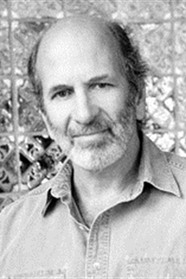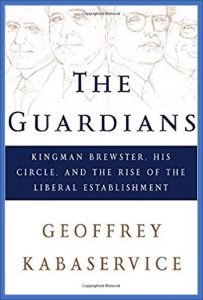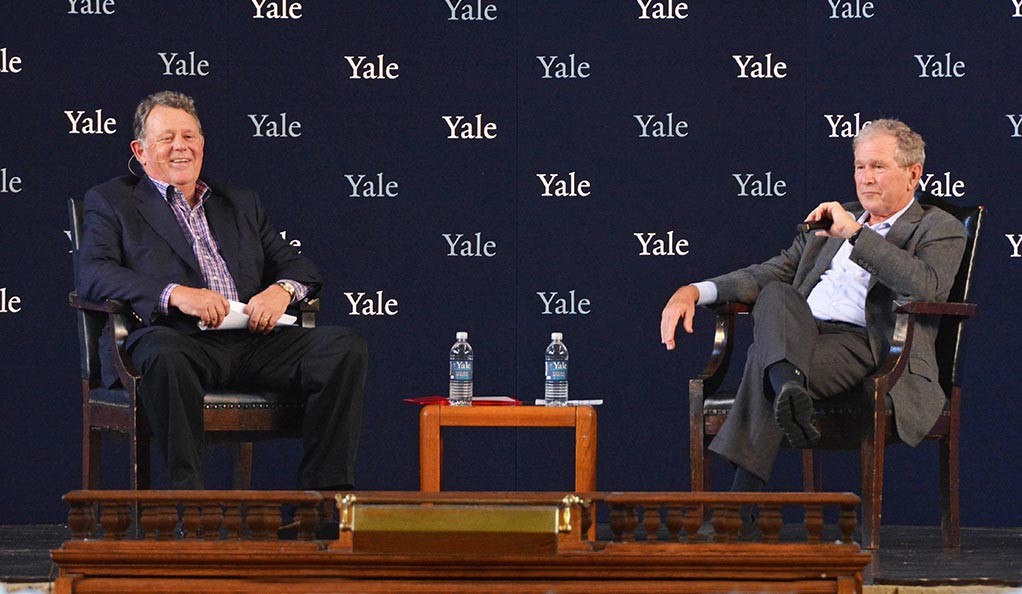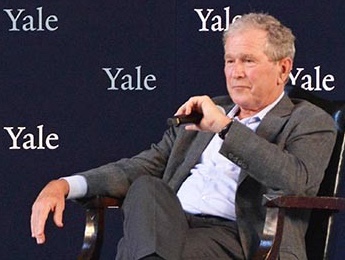Report From the 1968 Reunion
Editor’s Note: To help Reunion co-chairs with their work, the AYA invites them to shadow the prior year’s Class as it plans and conducts its reunion. Our Reunion Co-Chair Bill Newman attended the 50th reunion of the class of 1968 last month.
This is an excerpt from his report to the broader Reunion Planning Committee. It starts with what ’68 did and ends with some thoughts about our reunion:
Thursday: Remembrance of Viet Nam
On the first day of their reunion, the Class of 1968 held an open forum discussion called “Viet Nam Remembered” in the large presentation hall in Sprague Hall. Two class members moderated the discussion by calling on speakers in response to raised hands and made certain that each speaker had access to a portable microphone.
The Format:
a “Quaker Meeting”
The Reunion’s organizers had established the format of the presentation as a “Quaker Meeting”–each speaker had the floor for 3 minutes, and no other speaker could address or challenge whatever was said by another speaker. As a result, each speaker could speak safely without rebuttal or comment. The audience adhered to the rules. The program lasted over 2 hours and lent itself to several profound, insightful presentations. There were over thirty-five persons who spoke and articulated the ways in which the VietNam War had affected their lives. The audience was extraordinary controlled. Civility was the order of the day.
The presenters’ most repeated theme was the path not taken because of service or the avoidance of service, including contemplation of choices made under compulsion or choices not made at all. There were those who chose to serve, those who served because of the draft, as well as those who took a different route because of the draft–Peace Corps, teaching or other public service.
- Those who chose the Peace Corps reported that their lives wound up being enriched by the experience — hardly an outcome that could have been predicted given the circumstances in which the choice to go that route was made.
- Those who served in the military spoke of the hardships they encountered.
- Two of the speakers were widows, one of whom had lost her husband in a military air crash not long after the war concluded. She was a nurse and wanted to know what it was about men that attracted them to war. This comment led to a number of speakers acknowledging, some in the most emotional ways possible, that for all of the abhorrent things that they saw, there was an aspect of service in Vietnam that was invigorating, never to be equaled again in their lives.

Midway through the session the author/journalist and ‘68 class member Jacques Leslie read his presentation, which detailed his reporter’s story, both in Vietnam and Cambodia. His story was dramatic, deeply personal and riveting. His presentation definitely motivated others to speak.
Only one speaker (other than Leslie) read a prepared text which, in his case, was a bit of a polemic, the only polemic that was aired during the entire session. Interestingly, very fewer speakers told “war stories” as such — no Tim O’Brien, The Things They Carried tales. The tone was that of visitors to a far away land reciting what they learned from their journeys.
Civility ruled — everyone who spoke raised his or her hand to request access to the microphone. Three Yale students quickly ran to the next speaker with microphones. The moderators controlled the flow very well by calling on each speaker in sequence.
This was Yale at its best — the introspection of a spook evening combined with the conviction that each present had the right to speak.
As VietNam was an issue that each of us faced in our own ways, we are giving serious consideration to including a similar program in our event next June.
Friday:
 Part 1. History of the 60s at Yale. During our years at Yale, the institution changed in many ways. Our class was the last without women members. We saw the change from numerical grading to modified pass/fail; relief from mandatory coats and ties at meals; the arrival of drugs on campus; reduction in minimum course loads for a degree from 40 courses to 36; major changes in admissions (more public schools, more geographic diversity, more minorities); and significant increase in political activism.
Part 1. History of the 60s at Yale. During our years at Yale, the institution changed in many ways. Our class was the last without women members. We saw the change from numerical grading to modified pass/fail; relief from mandatory coats and ties at meals; the arrival of drugs on campus; reduction in minimum course loads for a degree from 40 courses to 36; major changes in admissions (more public schools, more geographic diversity, more minorities); and significant increase in political activism.
Geoffrey Kabaservice (’84 BA, 89 PhD) is author of The Guardians: Kingman Brewster, His Circle, and the Rise of the Liberal Establishment, a book about the history of the 60’s at Yale and the development of these policies by President Brewster, as well as the impact of William Sloane Coffin.
Professor Kabaservice gave his very interesting lecture in a packed Woolsey Hall, complete with some relevant photographs, some behind-the-scenes things we didn’t know at the time and some trenchant observations and reflections. Judging both from the applause at completion and conversations with the members of the audience, his presentation to the Class of ‘68 was very well received. An interesting coincidence in that this venue was the very site of President Brewster’s leadership charge to us. Professor Kabaservice has offered to give a similar talk to our class, and we are considering his offer.
Part 2. Classmate Presentations. The Class of ‘68 also had a program comprised of 7 short presentations from classmates who were particularly proud of their accomplishments. The topics included:
- The development of an independent film company;
- Reforestation of significant acreage in Kenya over a 25-year period with a plant developed uniquely for the purpose;
- A mid-career crisis in a conventional advertising business which led to the commercialization of a new nutrition product; and
- Virtuoso playing of classical guitar pieces.
The program was well-attended and well-received.
Part 3. Reflections From George W. Bush.
Roland Betts (JE ’68), a former Senior Fellow with the Yale Corporation, interviewed President George W. Bush in Woolsey Hall. The session was very well attended, and President Bush did let his hair down quite a bit.

He covered a broad range of issues — Yale, youth, politics and the future. There are some great books out there about Presidential character, but surely there is no substitute for watching the Presidential person at close vantage as he has a sincerely felt conversation with an old friend. I’m not going to spend a lot of time on this session because, without a US President in our class, we simply can’t do something like this!
The ‘68 Reunion spurred thinking and debate among its attendees. The presentations were exceptionally well-thought through, showing the significant time of both the organizers and the attendees. Although we may not follow these precedents exactly, they exemplify that great programs make for great reunions. That idea inspires our Reunion Committee as we enter these last few months of planning.


It seems that Bill Newman had a good time observing the 1968 Reunion. He reported on some aspects of it very well, but he seems to have missed an important nuance about the undercurrent that was present throughout the celebrations of the Class of 1968 in New Haven.
In particular, Bill seems to have missed the element of controversy and simmering debate that surrounded almost all of the class deliberations. He writes, for example, “There are some great books out there about Presidential character, but surely there is no substitute for watching the Presidential person at close vantage as he has a sincerely felt conversation with an old friend.”
This characterization of the event is a peculiar one and largely out of sync with many of the Class of 1968 who attended it. In reality, there were serious reservations expressed by many in the class of 1968 about whether or not GW should be featured in the program at all, especially in the light of the legacy of the questionable programs and failed policies that he left as a legacy to the country and the world in the wake of his Presidency. In reality, there were many alternative narratives in the audience to the accounts GW offered from stage in his informal conversation with his former roommate.
As Bill noted, the attendance was large, but he failed to note that no questions were allowed. The whole event was staged as a “praise rally.” This represented something more akin to the “rallies” and “fundraising events” conducted by our current President. In any case, it was a sad departure from Yale’s long standing tradition of open and honest exchange on matters of collective importance.
To their credit the Yale Class officers did not actively suppress the counter narratives to the official praise-songs heaped upon GW throughout the official reunion events that Bill Newman attended. Apparently, however, Bill seems to have missed out on the richness and subtlety of the alternative narratives and exchanges that took place (and are still taking place) between the members of the Class of 1968 in a series of online letters, comments, and video essay sequences posted through http://YALE-68-50th.NET
In plans currently being made for the 1969 Reunion, it might be more helpful to include some “space” within the Reunion events themselves for the airing of some of the alternative narratives within our collective experience of the class, rather than have them be simply ignored or omitted from the programmed events as the Class of 1968 chose to do. Surely this could attract a greater range of people to the Reunion itself if they felt it could reflect or give expression to their experiences.
Some thoughts that were shared among class members but not as part of the official reunion events included:
The Yale Class of 1968 – Marked by Memories of Pain and Suffering
https://environmentaljusticetv.wordpress.com/2018/03/20/yale-class-of-1968-were-poor-little-lambs-whove-lost-our-way-baa-baa-baa/
“Nostalgia ain’t what it used to be…” (Yogi Berra)
https://environmentaljusticetv.wordpress.com/2018/05/15/i-became-a-confirmed-institutionalist/
Class Reunions – Yale 1968
https://environmentaljusticetv.wordpress.com/2018/05/06/class-reunions-yale-1968/
The Tragic Legacy of The Class of 1968: Carbon Fuels, Catabolic Climate Collapse and the Future of the Human Prospect
https://environmentaljusticetv.wordpress.com/2018/04/30/the-legacy-of-the-yale-class-of-1968-and-the-future-of-the-human-prospect/
and
“On our watch,” Yale ’68, the world was hijacked.
https://www.youtube.com/watch?v=rvH6iju6R2I&list=PLr2L6TB8fh8GjveAJm9GJkOOFKeECEaMv